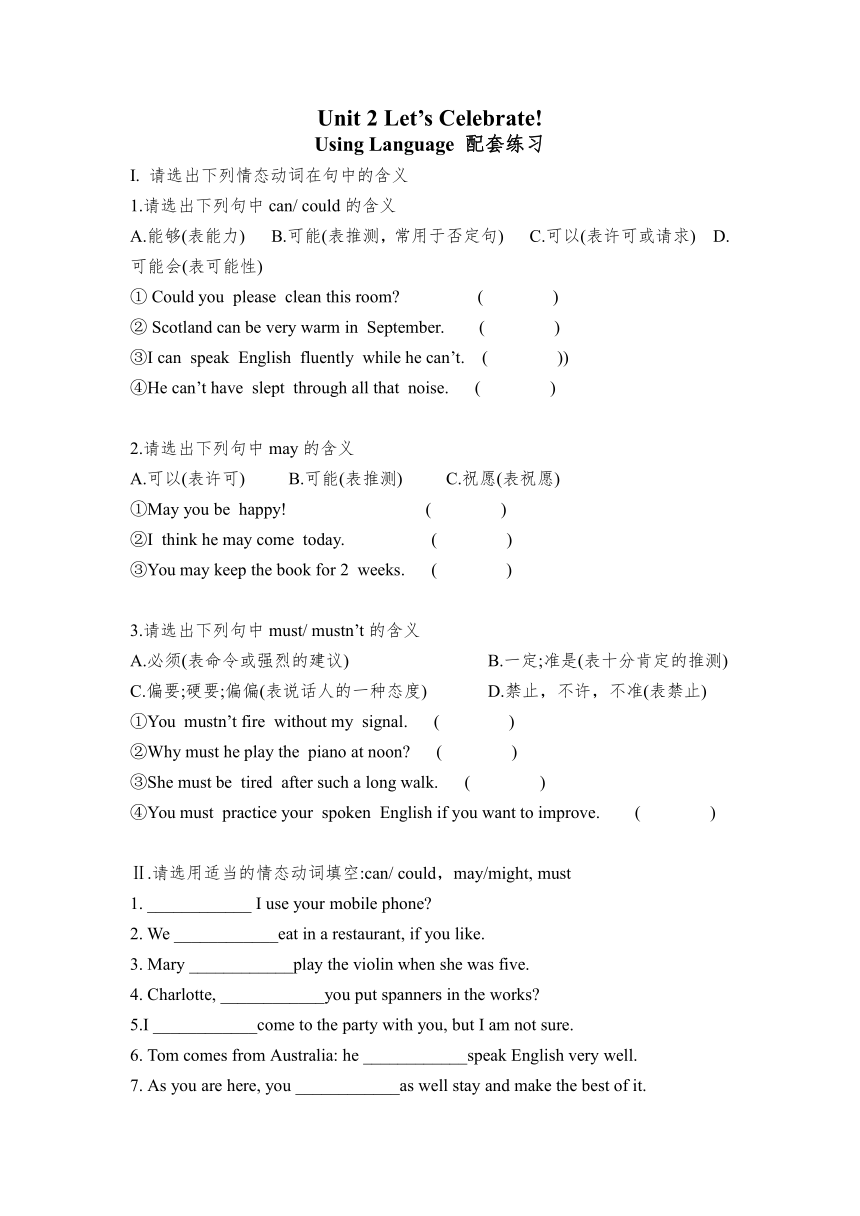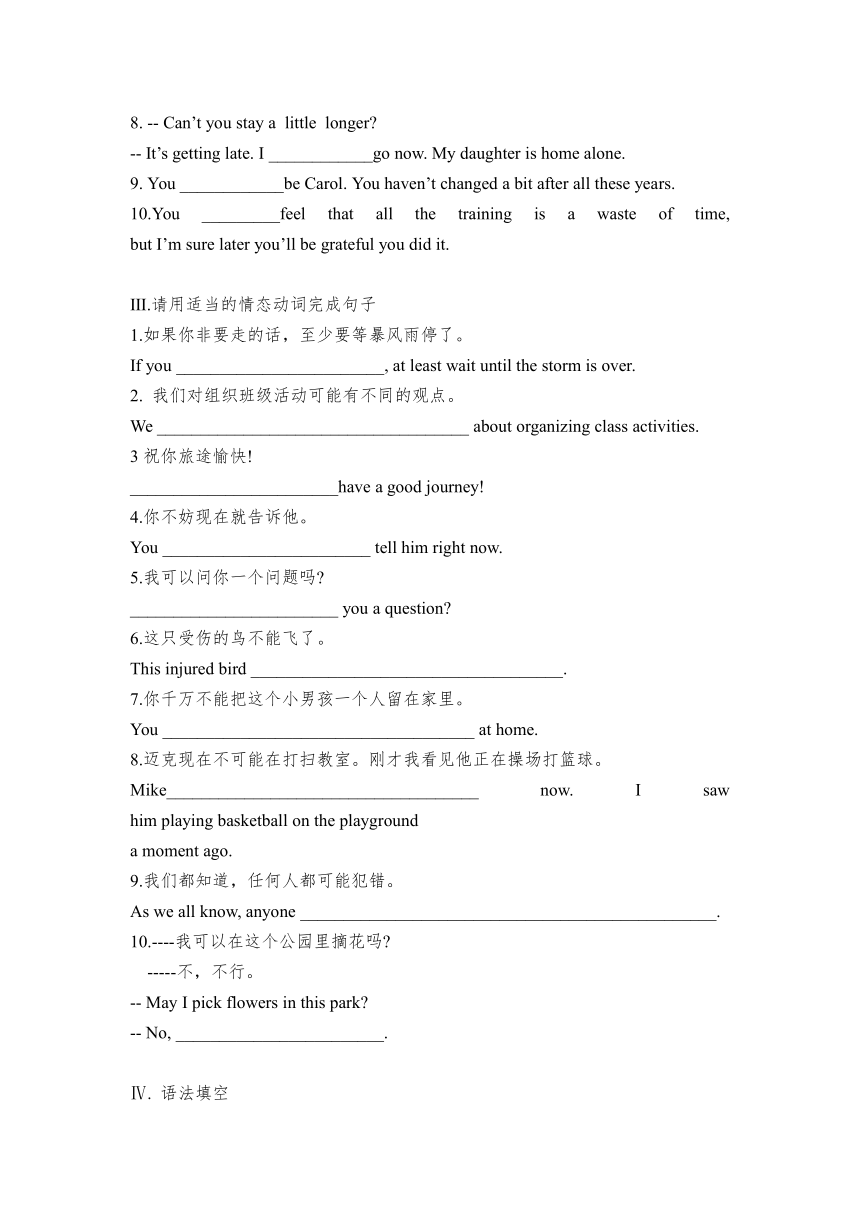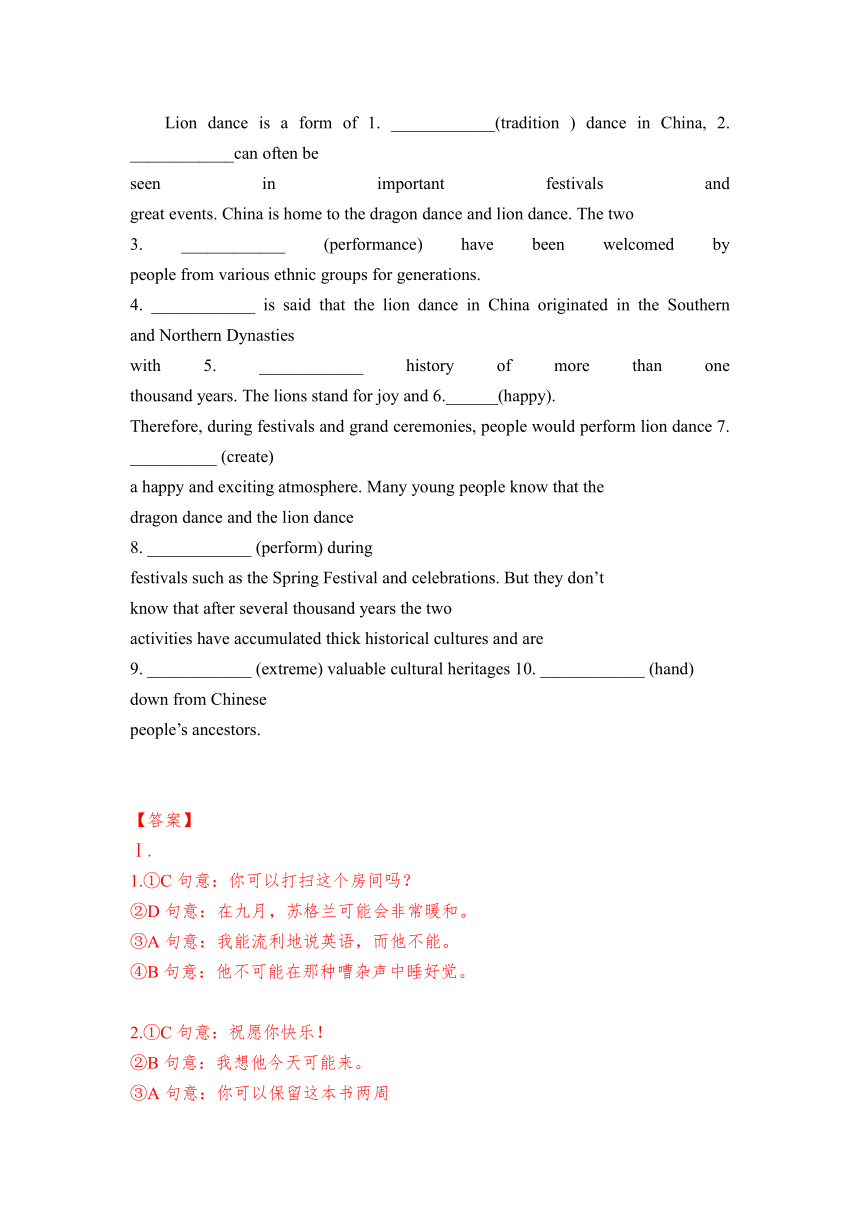外研版(2019)必修第二册Unit 2 Let's celebrate! Using Languge同步练习(Word含答案)
文档属性
| 名称 | 外研版(2019)必修第二册Unit 2 Let's celebrate! Using Languge同步练习(Word含答案) |

|
|
| 格式 | zip | ||
| 文件大小 | 20.9KB | ||
| 资源类型 | 教案 | ||
| 版本资源 | 外研版(2019) | ||
| 科目 | 英语 | ||
| 更新时间 | 2022-12-07 16:31:48 | ||
图片预览



文档简介
Unit 2 Let’s Celebrate!
Using Language 配套练习
I. 请选出下列情态动词在句中的含义
1.请选出下列句中can/ could的含义
A.能够(表能力) B.可能(表推测,常用于否定句) C.可以(表许可或请求) D.可能会(表可能性)
① Could you please clean this room ( )
② Scotland can be very warm in September. ( )
③I can speak English fluently while he can’t. ( ))
④He can’t have slept through all that noise. ( )
2.请选出下列句中may的含义
A.可以(表许可) B.可能(表推测) C.祝愿(表祝愿)
①May you be happy! ( )
②I think he may come today. ( )
③You may keep the book for 2 weeks. ( )
3.请选出下列句中must/ mustn’t的含义
A.必须(表命令或强烈的建议) B.一定;准是(表十分肯定的推测)
C.偏要;硬要;偏偏(表说话人的一种态度) D.禁止,不许,不准(表禁止)
①You mustn’t fire without my signal. ( )
②Why must he play the piano at noon ( )
③She must be tired after such a long walk. ( )
④You must practice your spoken English if you want to improve. ( )
Ⅱ.请选用适当的情态动词填空:can/ could,may/might, must
1. ____________ I use your mobile phone
2. We ____________eat in a restaurant, if you like.
3. Mary ____________play the violin when she was five.
4. Charlotte, ____________you put spanners in the works
5.I ____________come to the party with you, but I am not sure.
6. Tom comes from Australia: he ____________speak English very well.
7. As you are here, you ____________as well stay and make the best of it.
8. -- Can’t you stay a little longer
-- It’s getting late. I ____________go now. My daughter is home alone.
9. You ____________be Carol. You haven’t changed a bit after all these years.
10.You _________feel that all the training is a waste of time, but I’m sure later you’ll be grateful you did it.
Ⅲ.请用适当的情态动词完成句子
1.如果你非要走的话,至少要等暴风雨停了。
If you ________________________, at least wait until the storm is over.
2. 我们对组织班级活动可能有不同的观点。
We ____________________________________ about organizing class activities.
3祝你旅途愉快!
________________________have a good journey!
4.你不妨现在就告诉他。
You ________________________ tell him right now.
5.我可以问你一个问题吗
________________________ you a question
6.这只受伤的鸟不能飞了。
This injured bird ____________________________________.
7.你千万不能把这个小男孩一个人留在家里。
You ____________________________________ at home.
8.迈克现在不可能在打扫教室。刚才我看见他正在操场打篮球。
Mike____________________________________ now. I saw him playing basketball on the playground
a moment ago.
9.我们都知道,任何人都可能犯错。
As we all know, anyone ________________________________________________.
10.----我可以在这个公园里摘花吗
-----不,不行。
-- May I pick flowers in this park
-- No, ________________________.
Ⅳ. 语法填空
Lion dance is a form of 1. ____________(tradition ) dance in China, 2. ____________can often be
seen in important festivals and great events. China is home to the dragon dance and lion dance. The two
3. ____________ (performance) have been welcomed by people from various ethnic groups for generations.
4. ____________ is said that the lion dance in China originated in the Southern and Northern Dynasties
with 5. ____________ history of more than one thousand years. The lions stand for joy and 6.______(happy).
Therefore, during festivals and grand ceremonies, people would perform lion dance 7. __________ (create)
a happy and exciting atmosphere. Many young people know that the dragon dance and the lion dance
8. ____________ (perform) during festivals such as the Spring Festival and celebrations. But they don’t
know that after several thousand years the two activities have accumulated thick historical cultures and are
9. ____________ (extreme) valuable cultural heritages 10. ____________ (hand) down from Chinese
people’s ancestors.
【答案】
Ⅰ.
1.①C句意:你可以打扫这个房间吗?
②D句意:在九月,苏格兰可能会非常暖和。
③A句意:我能流利地说英语,而他不能。
④B句意:他不可能在那种嘈杂声中睡好觉。
2.①C句意:祝愿你快乐!
②B句意:我想他今天可能来。
③A句意:你可以保留这本书两周
3.①D句意:没我的信号你不许开枪。
②C句意:他为什么偏偏中午弹钢琴呢?
③B句意:走了这么长一段路,她一定累了。
④A句意:如果你想提高,你必须练习你的英语口语。
Ⅱ.
1.May/Can/Could句意:我可以使用你的手机吗?本句中m、cm,could均可用于征求对方的许可。
2.can句意:如果你喜欢的话,我们可以去餐馆吃饭。本句中can意为“可以”,用于提出建议。
3.could句意:玛丽五岁时就会拉小提琴。句中could表示能力,用于过去时态中。
4.must句意:夏洛特,你偏要从中捣乱吗?本句中mu意为“偏要”。
5.may句意:我可能和你一起去参加聚会,但我不确定。根据空后but I am not sure可知,本句应用may表示“可能”。
6.can/must句意①:汤姆来自澳大利亚,他能很好地说英语。can表示能力。句意②:汤姆来自澳大利亚,他英语一定说得很好。must表肯定的推测,意为“一定:准是”。故本题应填can/musl。
7.may/might句意:既然你在这里,你不妨留下来并且好好利用它。“may/might as well-+动词原形”意为“不妨,还不如”。
8.must句意:你不能再待时间长一点吗?—时候不早了,我现在必须得走了。我女儿自己在家呢。本句中must意为“必须”。
9.mus1句意:你一定是卡萝尔。这些年来你一点都没变。本句中must意为“一定”,表肯定的推测。
10.may句意:你可能觉得所有的训练都是浪费时间,但我肯定,以后你就会感激你自己训练过了。本句中my意为“可能”。
III.
1.must go
2.may have different opinions
3.May you
4.may as well
5.May/Can/Could I ask
6.can’t fly
7.mustn’t leave the little boy alone
8.can’t be cleaning the classroom
9.can make
V.语篇解读本文是一篇说明文,介绍了舞狮、舞龙的传统和历史。
1.traditional
考查形容词。句意:舞狮是中国传统舞蹈的一种形式,在重要的节日和重大活动中经常可以看到舞狮。本空修饰名词dance,故应用形容词traditional“传统的”。
2,which
考查非限制性定语从句。句意:同上。本空引导非限制性定语从句,修饰名词Lion dance,本空在定语从句中作主语,指物,故应用which。
3.performances
考查名词复数。句意:这两种表演受到各民族人民世世代代的欢迎。根据空前的two可知,本空应用名词复数形式。
4.It
考查代词。句意:据说中国的舞狮起源于南北朝时期,已有一千多年的历史。本句包含“It is said + that从句” 句型,其中山作形式主语,hal从句作真正的主语。信
5.a
考查冠词。句意:同上。with a history of意为“有…的历史”,故本空应用不定冠词a。
6.happiness
考查名词。句意:狮子代表快乐和幸福。本空和空前名词joy共同作stand for的宾语,故本空应用名词。
7.to create
考查不定式。句意:因此,在节日和盛大的庆典活动期间,人们会表演舞狮来营造一种快乐而激动人心的气氛。本空在句中作目的状语,故应用不定式。
8.are performed
考查时态、语态和主谓一致。句意:很多年轻人都知道,舞龙和舞狮是在像春节这样的节日和庆典上表演的。根据主句谓语动词know可知,本空应用一般现在时,且从句主语the dragon dance and the lion dance为复数,且与perform之间为被动关系,故本空应用are performed。
9.extremely
考查副词。本空修饰形容词valuable,故应用副词 extremely “极其,非常”。
10.handed
考查非谓语动词。本空作定语修饰名词heritages,且被修饰词和hand之间为被动关系,故本空应用过去分词作后置定语。
Using Language 配套练习
I. 请选出下列情态动词在句中的含义
1.请选出下列句中can/ could的含义
A.能够(表能力) B.可能(表推测,常用于否定句) C.可以(表许可或请求) D.可能会(表可能性)
① Could you please clean this room ( )
② Scotland can be very warm in September. ( )
③I can speak English fluently while he can’t. ( ))
④He can’t have slept through all that noise. ( )
2.请选出下列句中may的含义
A.可以(表许可) B.可能(表推测) C.祝愿(表祝愿)
①May you be happy! ( )
②I think he may come today. ( )
③You may keep the book for 2 weeks. ( )
3.请选出下列句中must/ mustn’t的含义
A.必须(表命令或强烈的建议) B.一定;准是(表十分肯定的推测)
C.偏要;硬要;偏偏(表说话人的一种态度) D.禁止,不许,不准(表禁止)
①You mustn’t fire without my signal. ( )
②Why must he play the piano at noon ( )
③She must be tired after such a long walk. ( )
④You must practice your spoken English if you want to improve. ( )
Ⅱ.请选用适当的情态动词填空:can/ could,may/might, must
1. ____________ I use your mobile phone
2. We ____________eat in a restaurant, if you like.
3. Mary ____________play the violin when she was five.
4. Charlotte, ____________you put spanners in the works
5.I ____________come to the party with you, but I am not sure.
6. Tom comes from Australia: he ____________speak English very well.
7. As you are here, you ____________as well stay and make the best of it.
8. -- Can’t you stay a little longer
-- It’s getting late. I ____________go now. My daughter is home alone.
9. You ____________be Carol. You haven’t changed a bit after all these years.
10.You _________feel that all the training is a waste of time, but I’m sure later you’ll be grateful you did it.
Ⅲ.请用适当的情态动词完成句子
1.如果你非要走的话,至少要等暴风雨停了。
If you ________________________, at least wait until the storm is over.
2. 我们对组织班级活动可能有不同的观点。
We ____________________________________ about organizing class activities.
3祝你旅途愉快!
________________________have a good journey!
4.你不妨现在就告诉他。
You ________________________ tell him right now.
5.我可以问你一个问题吗
________________________ you a question
6.这只受伤的鸟不能飞了。
This injured bird ____________________________________.
7.你千万不能把这个小男孩一个人留在家里。
You ____________________________________ at home.
8.迈克现在不可能在打扫教室。刚才我看见他正在操场打篮球。
Mike____________________________________ now. I saw him playing basketball on the playground
a moment ago.
9.我们都知道,任何人都可能犯错。
As we all know, anyone ________________________________________________.
10.----我可以在这个公园里摘花吗
-----不,不行。
-- May I pick flowers in this park
-- No, ________________________.
Ⅳ. 语法填空
Lion dance is a form of 1. ____________(tradition ) dance in China, 2. ____________can often be
seen in important festivals and great events. China is home to the dragon dance and lion dance. The two
3. ____________ (performance) have been welcomed by people from various ethnic groups for generations.
4. ____________ is said that the lion dance in China originated in the Southern and Northern Dynasties
with 5. ____________ history of more than one thousand years. The lions stand for joy and 6.______(happy).
Therefore, during festivals and grand ceremonies, people would perform lion dance 7. __________ (create)
a happy and exciting atmosphere. Many young people know that the dragon dance and the lion dance
8. ____________ (perform) during festivals such as the Spring Festival and celebrations. But they don’t
know that after several thousand years the two activities have accumulated thick historical cultures and are
9. ____________ (extreme) valuable cultural heritages 10. ____________ (hand) down from Chinese
people’s ancestors.
【答案】
Ⅰ.
1.①C句意:你可以打扫这个房间吗?
②D句意:在九月,苏格兰可能会非常暖和。
③A句意:我能流利地说英语,而他不能。
④B句意:他不可能在那种嘈杂声中睡好觉。
2.①C句意:祝愿你快乐!
②B句意:我想他今天可能来。
③A句意:你可以保留这本书两周
3.①D句意:没我的信号你不许开枪。
②C句意:他为什么偏偏中午弹钢琴呢?
③B句意:走了这么长一段路,她一定累了。
④A句意:如果你想提高,你必须练习你的英语口语。
Ⅱ.
1.May/Can/Could句意:我可以使用你的手机吗?本句中m、cm,could均可用于征求对方的许可。
2.can句意:如果你喜欢的话,我们可以去餐馆吃饭。本句中can意为“可以”,用于提出建议。
3.could句意:玛丽五岁时就会拉小提琴。句中could表示能力,用于过去时态中。
4.must句意:夏洛特,你偏要从中捣乱吗?本句中mu意为“偏要”。
5.may句意:我可能和你一起去参加聚会,但我不确定。根据空后but I am not sure可知,本句应用may表示“可能”。
6.can/must句意①:汤姆来自澳大利亚,他能很好地说英语。can表示能力。句意②:汤姆来自澳大利亚,他英语一定说得很好。must表肯定的推测,意为“一定:准是”。故本题应填can/musl。
7.may/might句意:既然你在这里,你不妨留下来并且好好利用它。“may/might as well-+动词原形”意为“不妨,还不如”。
8.must句意:你不能再待时间长一点吗?—时候不早了,我现在必须得走了。我女儿自己在家呢。本句中must意为“必须”。
9.mus1句意:你一定是卡萝尔。这些年来你一点都没变。本句中must意为“一定”,表肯定的推测。
10.may句意:你可能觉得所有的训练都是浪费时间,但我肯定,以后你就会感激你自己训练过了。本句中my意为“可能”。
III.
1.must go
2.may have different opinions
3.May you
4.may as well
5.May/Can/Could I ask
6.can’t fly
7.mustn’t leave the little boy alone
8.can’t be cleaning the classroom
9.can make
V.语篇解读本文是一篇说明文,介绍了舞狮、舞龙的传统和历史。
1.traditional
考查形容词。句意:舞狮是中国传统舞蹈的一种形式,在重要的节日和重大活动中经常可以看到舞狮。本空修饰名词dance,故应用形容词traditional“传统的”。
2,which
考查非限制性定语从句。句意:同上。本空引导非限制性定语从句,修饰名词Lion dance,本空在定语从句中作主语,指物,故应用which。
3.performances
考查名词复数。句意:这两种表演受到各民族人民世世代代的欢迎。根据空前的two可知,本空应用名词复数形式。
4.It
考查代词。句意:据说中国的舞狮起源于南北朝时期,已有一千多年的历史。本句包含“It is said + that从句” 句型,其中山作形式主语,hal从句作真正的主语。信
5.a
考查冠词。句意:同上。with a history of意为“有…的历史”,故本空应用不定冠词a。
6.happiness
考查名词。句意:狮子代表快乐和幸福。本空和空前名词joy共同作stand for的宾语,故本空应用名词。
7.to create
考查不定式。句意:因此,在节日和盛大的庆典活动期间,人们会表演舞狮来营造一种快乐而激动人心的气氛。本空在句中作目的状语,故应用不定式。
8.are performed
考查时态、语态和主谓一致。句意:很多年轻人都知道,舞龙和舞狮是在像春节这样的节日和庆典上表演的。根据主句谓语动词know可知,本空应用一般现在时,且从句主语the dragon dance and the lion dance为复数,且与perform之间为被动关系,故本空应用are performed。
9.extremely
考查副词。本空修饰形容词valuable,故应用副词 extremely “极其,非常”。
10.handed
考查非谓语动词。本空作定语修饰名词heritages,且被修饰词和hand之间为被动关系,故本空应用过去分词作后置定语。
